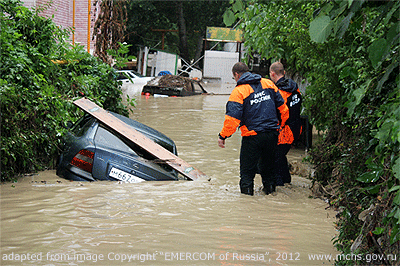The Blame Game
Deadly Flooding in Southern Russia Is the Latest Incident to Have Galvanized Anger at the Authorities

Copyright 2012
“EMERCOM of Russia”, mchs.gov.ruThe destructive floods that wreaked havoc in southern Russia this weekend, killing more than 170 people, have set off a characteristically Russian blame game. Within days of the tragedy, local residents are blaming authorities for failing to warn them, and even for instigating the flood, while the authorities themselves are looking for scapegoats to ease the criticism. The event has become especially politicized, since each step for the authorities and opposition activists alike could prove to be either a symbolic victory or defeat in the midst of the government's ever-sliding popularity. So how will the Kremlin come out of this one?
The town of Krymsk, in the Krasnodar Region, was the worst hit by the flooding, which turned out to be among the most damaging natural disasters in Russia in recent years. A weekend storm dumped reportedly up to 11 inches of rain within a day onto the city of 60,000, which sits near the Black Sea, and sent rivers gushing through the streets throughout Saturday morning. Residents described enormous waves of water carrying mud and debris through Krymsk, destroying homes and drowning scores of people.
President Vladimir Putin declared July 9 a day of national mourning after he flew over the scene on Saturday to inspect the damage a characteristic move by a leader who cherishes his image as an action man who takes charge in moments of crisis. And although Putin ordered an investigation into the flooding, as well as promised compensation of up to $60,000 for families that lost loved ones, this hasn't stopped the maelstrom of anger and discontent from building up against the authorities.
Immediately after disaster struck, the locals began asking questions. Foremost among them: why didn't anyone warn us? Many quickly deduced foul play. "If we had been warned, people could have been saved," 50-year-old local resident Irina Loskutova told The Guardian on Monday. "They knew and they didn't tell us." Other Krymsk natives went even further and charged officials with specifically opening the gates to a local reservoir and flooding Krymsk in order to spare nearby Novorossiysk, a crucial Black Sea port city, The Guardian reported. They also said emergency rescue workers appeared on the scene late.
For their part, local authorities, led by Krasnodar Governor Alexander Tkachev, said warnings were sent out late on Friday night, a mere several hours before the flash floods began. But it seems his efforts were quickly torpedoed by his own contingency, as Emergency Minister Vladimir Puchkov admitted on Monday that his ministry failed to send out enough warnings, via text message, in time. "A system to warn the residents was set up," he said at a government meeting, the Associated Press reported. "But, unfortunately, not everyone was warned early enough."
The entire affair amounts to yet another official fumble that has further galvanized anger at officialdom this time in Russia's regions. Opposition forces have taken their fight to Krymsk with the aim of leveraging the authorities' apparent lack of response, flocking to the city in a show of support and contributing what they can to the relief effort. But it hasn't come without a dose of political mudslinging: when Yabloko leader Sergei Mitrokhin tweeted on Monday that local officials were promising full compensation to residents who signed statements saying they were warned, star United Russia Parliament Deputy Robert Schlegel, who was also in the city, shot back: "Liar." What's more, the liberal Just Russia Party has announced it will seek Tkachev's dismissal over the disaster.
This tit-for-tat is nothing new and it certainly shouldn't come as a surprise. After a steadily building wave of discontent with the authorities during the last six months, opposition activists have jumped at nearly every chance to embarrass the Kremlin. In the Krymsk affair, there's a battle raging in which "the stakes have become very high," according to political analyst Pavel Salin, because of society's steadily eroding trust in the government. "When in recent years similar types of tragedies occurred, it didn't really adversely affect the authorities," he said. "If you remember the Kursk [submarine] incident, Putin reacted late and his opponents criticized him for it, but from the point of view of his support base it didn't have any effect at all."
Yet it seems public furor over the flood has stopped just short of the boiling point. Recall the widespread unease among Russia's urban intellectuals that settled in after Putin's reelection: many analysts warned that any serious missteps by the Kremlin particularly with regard to society and its wellbeing would prove disastrous for the authorities. One more major mistake, the narrative held, and it would be over for Putin. But after a season of violence, crackdowns and pointed signals from the Kremlin, such as with the recent anti-protest and anti-NGO legislation, it seems that the "breaking point" is still far away.
Other experts said that with the absence of any singular event of critical meaning, popular disenfranchisement with the government will continue to slide steadily with each perceived mistake. "It's more rational to speak about the whole series of mistakes and accidents that are considered to be the government's fault. [Krymsk] is not critical alone, but it does come at a very troubling time for the government," said Nikolay Petrov of the Carnegie Moscow Center. But he also added that it's a particularly tough spot for Putin, the famed patriarchal figure, personally: "It's him who developed a paternalistic relationship between the state and citizens, which is why, if these kinds of catastrophes are happening, everybody feels the state should take care of everything before it happens, and it should take care of fixing the problem."

